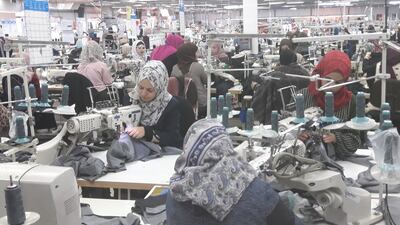Jordanian authorities on Monday unveiled a plan to improve its economy but a World Bank official said the kingdom would remain in stagnation as long as people prefer state jobs and women are excluded from the workforce.
The economy has been mostly stagnant for the last 12 years, with unemployment officially at a record high of about 24 per cent and foreign investment falling sharply from a $3.6 billion peak in 2006 to $726 million in 2021, UN data indicates.
The retreat prompted King Abdullah to convene meetings over the past several months of loyalist academics, businessmen and officials to come up with a plan to create more jobs, expand the middle class and raise living standards.
A 123-page official document with proposed solutions was released on Monday at a Dead Sea event attended by the king.
The biggest challenge is to find jobs for one million young people expected to be looking for work over the next decade. Raising average incomes by 3 per cent every year and making substantial improvements in living standards are also pressing goals for the government.
Per capita income in the kingdom of 10 million people is $4,300 a year. The government says the economy grew 2 per cent last year, compared with a 2 per cent contraction in 2020. The document predicts 3 per cent annual growth for the next decade.
It said the economy has been worsening because of rising energy prices, weak demand, less foreign investment and a “retreat in productivity and competitiveness and weakness in innovation”.
The documents envisages $5bn of investment a year for the next decade to raise farm and mining production, expand pharmaceutical and other industries, improve the water, transport and gas infrastructure, and introduce a 5G network, as well as expanding national medical insurance.
Prime Minister Bisher Al Khasawneh said the solutions require “real partnership with the private sector”.
“This document allows us to be ambitious,” he said. "It is based on hypothesis and on figures."
The government has been trying to lure private investors to put money into major infrastructure by offering them concessions and tax breaks.
But only a few significant projects have come to fruition under this framework. One of them was a 25-year concession awarded to consortium French company Aeroports de Paris to build and operate Amman’s new airport.
On Monday the government announced that it had awarded a 25-year concession to build a $400 million hospital and private university near Amman to a company mostly owned by the Saudi Public Investment Fund.
Saroj Kumar Jha, director of the World Bank’s Mashreq department, which covers Lebanon, Iraq, Syria, Jordan and Iran, said the kingdom needs to create what he calls a culture of entrepreneurship and to allocate money to research and development.
“If we only value government jobs we have a problem,” Mr Jha told a session attended by Crown Prince Hussein, the king’s eldest son.
The public sector accounts for at least 40 per cent of the jobs in the country, overwhelmingly awarded to members of the country's tribes, who also underpin the security forces.
Mr Jha said Jordan needs to encourage women to join the workforce.
“We cannot expect this country to have a vision for 2030 with only 20 per cent of the women active in the economic space,” he said.







